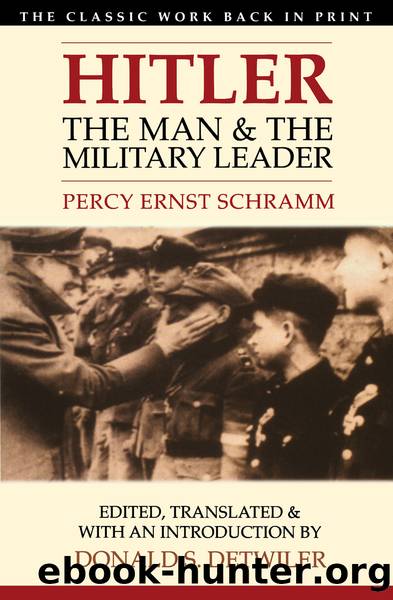Hitler by Percy Ernst Schramm

Author:Percy Ernst Schramm
Language: eng
Format: epub
Publisher: Chicago Review Press
Published: 1999-08-14T16:00:00+00:00
METHODOLOGICAL REFLECTIONS
By virtue of his personality, his ideas, and the fact that he misled millions, Hitler poses an historical problem of the first magnitude. At first, attempts were made to deal with him historically by somehow fitting him into the stream of German intellectual history and accounting for his immense following by attributing it to the German national character or the peculiar course of German history. In this context, Luther, Frederick the Great, and Bismarck would of course have to assume the role of forerunners of National Socialism. The Times Literary Supplement once went so far as to assert that Leopold von Ranke prepared the way for the Third Reich.8
We need not waste time with the psychological superficiality underlying assertions that an entire people has definite, tangible characteristics. Nor need we discuss the intellectual short-circuits and historical confusion implicit in the kind of ideological interpretation which asserts the inevitability of a given course of events. Given the many alternatives available at any one time, such inevitability can only be argued by overemphasizing one detail and thus distorting the whole. Theses of this sort rest on methodological fallacies.
Three particular warnings should be added: One should not try to understand Hitler by focusing on his petty bourgeois origins. At certain points in our character analysis—as, for example, in connection with the question of his prejudices or his taste in art—we have pointed out manifestations and consequences of this background. Certainly it would be possible to find others as well. On the whole, however, tracing the sociological derivation of such factors does not take us far. What is important is that Hitler broke loose from the social level from which he came without settling into another. He belonged to no “class” or “estate.” Social history, therefore, cannot provide us with the sort of essential insight we need in order to understand Hitler.
A still more serious mistake would be to try to derive Hitler’s way of thinking from the Catholic Church, seeing in him a sort of secularized pope claiming infallibility. Hitler left the Catholic Church so early that its impact—even if one includes religious instruction in school—would have waned before his own system of “dogma” crystallized. It would probably have made no difference had Hitler’s parents already left the Church and sent him to a school without religious instruction. Whoever wishes to draw parallels between Nazism and Catholicism, between the structure of the National Socialist party and the Roman Catholic Church, may do so. But this is no more than a game of ideas and cannot lead to any true insight.
A question which must be weighed much more carefully is whether Hitler had typically German characteristics. This cannot be answered without first asking what is typically German. In the first place, great differences among the German people had their origins in the widely varying characteristics of the Germanic tribes. Profound religious divisions were hardened in a long and bitter series of wars. Even today, class differences of surprising tenacity still exist just below the surface of an outwardly democratized and demilitarized society.
Download
This site does not store any files on its server. We only index and link to content provided by other sites. Please contact the content providers to delete copyright contents if any and email us, we'll remove relevant links or contents immediately.
Blood and Oil by Bradley Hope(1250)
Daniel Holmes: A Memoir From Malta's Prison: From a cage, on a rock, in a puddle... by Daniel Holmes(1118)
Ambition and Desire: The Dangerous Life of Josephine Bonaparte by Kate Williams(1088)
Wandering in Strange Lands by Morgan Jerkins(1019)
It Was All a Lie by Stuart Stevens;(942)
What Really Happened: The Death of Hitler by Robert J. Hutchinson(871)
London in the Twentieth Century by Jerry White(848)
Time of the Magicians by Wolfram Eilenberger(844)
The First Conspiracy by Brad Meltzer & Josh Mensch(813)
Twilight of the Gods by Ian W. Toll(813)
The Japanese by Christopher Harding(803)
A Woman by Sibilla Aleramo(797)
Lenin: A Biography by Robert Service(780)
The Devil You Know by Charles M. Blow(779)
Reading for Life by Philip Davis(775)
Cleopatra by Alberto Angela(769)
Twelve Caesars by Mary Beard(769)
1965--The Most Revolutionary Year in Music by Andrew Grant Jackson(715)
The Life of William Faulkner by Carl Rollyson(714)
